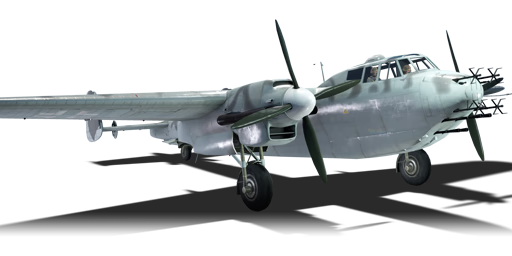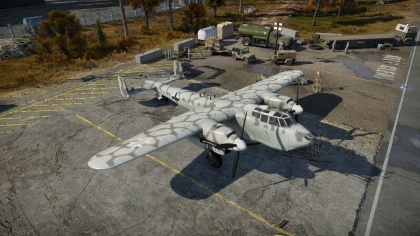Do 217 N-2
Contents
| This page is about the German twin-engine fighter Do 217 N-2. For other uses, see Do 217 (Family). |
Description
The Do 217 N-2 is a Rank II German twin-engine fighter
with a battle rating of 3.0 (AB), 2.7 (RB), and 3.3 (SB). It was introduced in Update 1.39.
General info
Flight Performance
| Characteristics | |||||||
|---|---|---|---|---|---|---|---|
| Stock | |||||||
| Max Speed (km/h at 5,500 m) |
Max altitude (meters) |
Turn time (seconds) |
Rate of climb (meters/second) |
Take-off run (meters) | |||
| AB | RB | AB | RB | AB | RB | ||
| 489 | 478 | 9000 | 29.7 | 30.8 | 3.3 | 4.4 | 800 |
| Upgraded | |||||||
| Max Speed (km/h at 5,500 m) |
Max altitude (meters) | Turn time (seconds) | Rate of climb (meters/second) |
Take-off run (meters) | |||
| AB | RB | AB | RB | AB | RB | ||
| ? | ? | 9000 | ??.? | ??.? | ??.? | ??.? | 800 |
Details
| Features | ||||
|---|---|---|---|---|
| Combat flap | Take-off flap | Landing flap | Air brakes | Arrestor gear |
| ✓ | ✓ | ✓ | X | X |
| Limits | ||||
|---|---|---|---|---|
| Wing-break speed (km/h) |
Gear limit (km/h) |
Combat flap (km/h) |
Max Static G | |
| + | - | |||
| 700 | 300 | 520 | ~3 | ~2 |
| Optimal velocities | |||
|---|---|---|---|
| Ailerons (km/h) |
Rudder (km/h) |
Elevators (km/h) |
Radiator (km/h) |
| < 290 | < 360 | < 360 | > 250 |
| Compressor (RB/SB) | ||
|---|---|---|
| Setting 1 | ||
| Optimal altitude | 100% Engine power | WEP Engine power |
| 5,000 m | 3,000 hp | 3,330 hp |
Survivability and armour
- 8.5 mm steel - bulkhead in front of cockpit
- 50 mm bulletproof glass - armoured windscreen and cockpit roof
- 5 mm steel - box containing Schrage musik cannons
- 5 mm steel - plate in tail
Armaments
Offensive armament
The Do 217 N-2 is armed with:
- 4 x 20 mm MG 151/20 cannons, chin-mounted (200 rpg = 800 total)
- 4 x 20 mm MG 151/20 cannons, Schräge Musik mounted in mid fuselage (200 rpg = 800 total)
- 4 x 7.92 mm MG 17 machine guns, nose-mounted (1,000 rpg = 4,000 total)
Usage in the battles
The Do 217 N-2 plays similar to most other heavy fighters, in that it is reliant on delivering a quick knock out punch to an enemy to be effective. However, the air craft has two unusual traits, which make for different play styles than other heavy fighters. The first is the lack of any form of turret weaponry. This problem makes the N-2 a unique member in the German heavy fighter line, as virtually all other heavy fighters either have a tail gunner, or are agile enough to not need one. The second feature, is the inclusion of a set of vertical firing cannons, known as Schräge Musik. This weapon package brings a unique benefit to the table. As most bombers lack the ability to fire their turrets directly under themselves, you can fire away with near complete immunity to retaliation from enemy gunners.
The N-2 is however, undeniably slow, and has crushingly poor maneuvering. This makes the lack of any form of turret defense all the more noticeable. Caution must be taken to avoid more nimble enemies when possible, as you will be greatly outclassed otherwise.
While the aircraft as a whole seems heavily dependent on lumbering up to a high altitude, and then slowly hunting down bombers, there does exist a fun, if unconventional, alternative. The alternative approach is to go about strafing ground targets, while flying upside down. The main reason for upside down strafing is the schräge musik. By flying inverted, you can strafe a large number of ground units in a single pass, while remaining fairly high above the trees. This combines well with the fact that the vertical and forward cannons use the same ammo belts. This tactic can even be put to use around airfields, putting a quick end to anyone on the ground. The only thing to remember when doing this, is to always keep a close eye on your altitude. Flying upside down will cause you to fall fairly quickly, so do remember to roll back to right side up in time to avoid crashing.
Radars
The Do 217 N-2 is equipped with a FuG 220 search radar, located in the nose of the aircraft; a control box which is part of the radar damage model is located behind the pilot.
| FuG 220 - Target Detection Radar | |||
|---|---|---|---|
| Maximum Detection Range |
Guaranteed Detection Range |
Max Azimuth Scan Angle |
Max Elevation Scan Angle |
| 5,000 m | 5,000 m | ±35° | -55°/+20° |
Manual Engine Control
| MEC elements | ||||||
|---|---|---|---|---|---|---|
| Mixer | Pitch | Radiator | Supercharger | Turbocharger | ||
| Oil | Water | Type | ||||
| Not controllable | Controllable | Not controllable | Controllable | Combined | Not ontrollable | Not controllable |
Modules
| Tier | Flight performance | Survivability | Weaponry | ||
|---|---|---|---|---|---|
| I | Fuselage Repair | Radiator | Offensive 7 mm | ||
| II | Compressor | Airframe | New 7 mm MGs | ||
| III | Wings Repair | Engine | Offensive 20 mm | ||
| IV | Engine Injection | Cover | New 20 mm MGs | ||
Pros and cons
Pros:
- Has access to a target detection radar
- FuG 220 radar is better than the FuG 202 radar found on other German planes
- Heavy and accurate front facing armament due to being centermounted
- Durable and can take a heavy beating
- Schrage musik can be a devastating surprise to anyone attempting to get into head on passes.
- Upside down strafing, while unconventional, can be of great fun and effect
Cons:
- No Defensive armament whatsoever unlike previous iterations
- Slow
- Very unmanuverable.
- Unless explicitely going for bomber hunting (which the flight model is exceptionally poor at) the Schrage Musik guns are of questionable value
- Schrage musik cannons' one second burst mass is included into the displayed one second burst mass for the plane, despite this not being physically feasible to achieve.
History
Describe the history of the creation and combat usage of the aircraft in more detail than in the introduction. If the historical reference turns out to be too big, take it to a separate article, taking a link to an article about the vehicle and adding a block "/ historical reference" (example: https://wiki.warthunder.com/Name-vehicles/historical reference) and add a link to it here using the main template. Be sure to include links to sources at the end of the article.
Media
An excellent addition to the article will be video guides, as well as screenshots from the game and photos.
Read also
Links to the articles on the War Thunder Wiki that you think will be useful for the reader, for example,
- reference to the series of the aircraft;
- links to approximate analogues of other nations and research trees.
Sources
Paste links to sources and external resources, such as:
- topic on the official game forum;
- page on aircraft encyclopedia;
- other literature.
| Germany twin-engine fighters | |
|---|---|
| Messerschmitt | Bf 109 Z-1 |
| Me 410 A-1/U2 · Me 410 B-1/U2 | |
| Dornier | Do 17 Z-7 · Do 217 J-1 · Do 217 J-2 · Do 217 N-1 · Do 217 N-2 |
| Focke-Wulf | Ta 154 A-1 |
| Junkers | Ju 88 C-6 · Ju 388 J |





